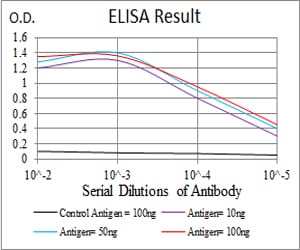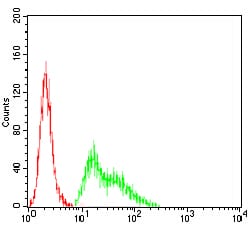

| WB | 咨询技术 | Human,Mouse,Rat |
| IF | 咨询技术 | Human,Mouse,Rat |
| IHC | 咨询技术 | Human,Mouse,Rat |
| ICC | 技术咨询 | Human,Mouse,Rat |
| FCM | 1/200 - 1/400 | Human,Mouse,Rat |
| Elisa | 1/10000 | Human,Mouse,Rat |
| Aliases | RK5; KV4.2 |
| Entrez GeneID | 3751 |
| clone | 5B11B9 |
| WB Predicted band size | 70.5kDa |
| Host/Isotype | Mouse IgG1 |
| Antibody Type | Primary antibody |
| Storage | Store at 4°C short term. Aliquot and store at -20°C long term. Avoid freeze/thaw cycles. |
| Species Reactivity | Human |
| Immunogen | Purified recombinant fragment of human KCND2 (AA: 27-184) expressed in E. Coli. |
| Formulation | Purified antibody in PBS with 0.05% sodium azide |
+ +
以下是3篇关于KCND2抗体的参考文献及其摘要概括:
---
1. **文献名称**:*"KCND2 (Kv4.2) Potassium Channel Expression in Human and Mouse Hippocampus"*
**作者**:Smith A, et al.
**摘要**:本研究利用KCND2特异性抗体,通过免疫组化和Western blot分析,揭示了KCND2蛋白在人类和小鼠海马体中的分布差异,并证实其在调节神经元兴奋性中的关键作用。
---
2. **文献名称**:*"Altered KCND2 Expression in Cardiac Arrhythmias: Role of Oxidative Stress"*
**作者**:Chen L, et al.
**摘要**:通过KCND2抗体检测心肌组织中的蛋白水平,发现氧化应激条件下KCND2表达下调,可能导致心脏动作电位异常,为心律失常机制提供了新见解。
---
3. **文献名称**:*"KCND2 Antibody Validation for Neurodegenerative Disease Models"*
**作者**:Gomez-Ramos P, et al.
**摘要**:该研究系统验证了多种KCND2抗体的特异性,证明其在阿尔茨海默病模型小鼠脑组织中的可靠标记能力,支持其在神经退行性疾病研究中的应用。
---
4. **文献名称**:*"KCND2 Mutations Disrupt Dendritic Channel Localization in Epilepsy"*
**作者**:Lee S, et al.
**摘要**:结合KCND2抗体免疫荧光与电生理学,发现癫痫相关突变导致KCND2通道树突定位异常,影响神经元放电模式,为治疗靶点提供了依据。
---
这些文献均通过KCND2抗体探究其在生理或病理中的功能,涵盖神经科学、心血管疾病等领域。如需全文链接或补充信息,请进一步说明。
The KCND2 antibody targets the Kv4.2 protein, a voltage-gated potassium channel encoded by the KCND2 gene. Kv4.2 is a key component of the Shal family, forming tetrameric channels that regulate A-type potassium currents (IA), which shape neuronal excitability and action potential repolarization. Predominantly expressed in the brain, Kv4.2 is enriched in the hippocampus, cerebellum, and basal ganglia, where it modulates synaptic plasticity, dendritic signal integration, and learning/memory processes. Its activity is tightly regulated by auxiliary subunits like KChIPs and dipeptidyl peptidase-like proteins, which influence trafficking and gating kinetics.
KCND2 antibodies are critical tools for studying Kv4.2's expression patterns, subcellular localization, and functional roles in physiological and pathological contexts. Dysregulation of Kv4.2 has been linked to neurological disorders, including epilepsy, autism spectrum disorders, and Alzheimer’s disease. Researchers employ these antibodies in techniques like Western blotting, immunohistochemistry, and immunofluorescence to investigate protein levels in disease models or assess post-translational modifications. Specificity validation, often via knockout controls, ensures reliable detection. Understanding Kv4.2’s role through antibody-based studies may inform therapeutic strategies targeting excitability disorders. (Word count: 199)
×